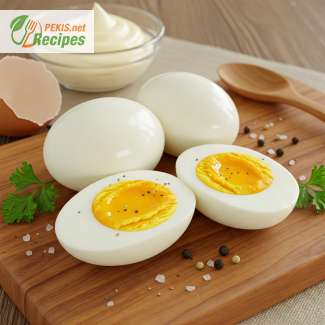
Hard-Boiled Egg: A Complete Guide to Nutrition, Benefits, and Uses
What is a Hard-Boiled Egg?
A hard-boiled egg is an egg that has been cooked by immersing it in boiling water until both the white and yolk have solidified. This cooking method is one of the simplest ways to prepare eggs, making them a popular ingredient in a variety of dishes. Hard-boiled eggs are known for their high protein content, ease of preparation, and versatility in meals.
The Science Behind Boiling Eggs
Hard-boiling an egg involves denaturation of proteins inside the egg due to heat. As the egg is heated, proteins in both the white and yolk coagulate, turning from liquid to solid. The ideal temperature for boiling an egg is around 100°C (212°F), though the exact cooking time depends on personal preferences and desired texture.
Nutritional Value of Hard-Boiled Eggs
Hard-boiled eggs are nutrient-dense, providing a combination of essential vitamins, minerals, and macronutrients. Below is a breakdown of their nutritional composition per one large hard-boiled egg (50g):
- Calories: ~77 kcal
- Protein: 6.3g
- Total Fat: 5.3g
- Saturated Fat: 1.6g
- Monounsaturated Fat: 2.0g
- Polyunsaturated Fat: 0.7g
- Cholesterol: 186mg
- Carbohydrates: 0.6g
- Sugar: 0.6g
- Sodium: 62mg
Vitamins and Minerals in Hard-Boiled Eggs
Hard-boiled eggs are rich in essential micronutrients, including:
- Vitamin A: Supports vision, skin health, and immune function
- Vitamin D: Crucial for bone health and immune support
- Vitamin B12: Essential for red blood cell formation and neurological function
- Choline: Important for brain development and liver function
- Folate: Supports DNA synthesis and cell division
- Iron: Helps in oxygen transportation in the body
- Phosphorus: Aids in bone and teeth health
- Selenium: Acts as an antioxidant, protecting cells from damage
Health Benefits of Hard-Boiled Eggs
Hard-boiled eggs provide numerous health benefits, making them an excellent choice for a balanced diet.
1. High-Quality Protein Source
Eggs are considered a complete protein, containing all nine essential amino acids necessary for muscle growth, tissue repair, and enzyme production.
2. Supports Brain Health
The choline found in eggs plays a crucial role in cognitive function, brain development, and memory enhancement.
3. Heart Health Benefits
Despite concerns about cholesterol, studies suggest that moderate egg consumption does not significantly increase heart disease risk. Instead, eggs help increase good HDL cholesterol levels, which benefits heart health.
4. Weight Management
Due to their high protein content, hard-boiled eggs help keep you full longer, reducing cravings and promoting satiety. This makes them an excellent addition to a weight-loss diet.
5. Eye Health
Eggs contain lutein and zeaxanthin, two antioxidants that protect against age-related macular degeneration and cataracts.
6. Strong Bones and Teeth
With Vitamin D and phosphorus, hard-boiled eggs contribute to bone strength and overall dental health.
How to Make the Perfect Hard-Boiled Egg
Follow these steps for perfectly cooked hard-boiled eggs every time:
- Choose Fresh Eggs – Older eggs tend to be easier to peel.
- Place Eggs in a Pot – Arrange them in a single layer to ensure even cooking.
- Add Water – Fill the pot with enough water to cover the eggs by at least one inch.
- Bring to a Boil – Heat on high until the water reaches a rolling boil.
- Turn Off Heat and Cover – Remove from heat and let eggs sit in hot water for 9-12 minutes, depending on desired doneness.
- Cool in Ice Bath – Transfer eggs to an ice bath immediately to stop cooking and make peeling easier.
- Peel and Enjoy!
How to Store Hard-Boiled Eggs
Proper storage ensures freshness and safety:
- Refrigerate immediately – Store eggs in a covered container in the fridge.
- Shelf life – Hard-boiled eggs stay fresh for up to 7 days.
- Avoid peeling before storing – Unpeeled eggs retain moisture and stay fresher longer.
Popular Uses of Hard-Boiled Eggs
Hard-boiled eggs are versatile and used in numerous dishes:
- Salads: Classic egg salad, Caesar salad, Nicoise salad
- Sandwiches & Wraps: Egg and mayo sandwich, avocado egg toast
- Breakfast Dishes: Deviled eggs, protein-packed omelets
- Snacks: Pickled eggs, Scotch eggs
- Garnishes: Ramen topping, potato salad ingredient
Can You Over-Boil an Egg?
Yes! Over-boiling can result in rubbery egg whites and a greenish-gray ring around the yolk, caused by a reaction between iron in the yolk and sulfur in the white. While still safe to eat, they may have a stronger sulfuric odor and altered texture.
Hard-Boiled Eggs vs. Soft-Boiled Eggs
- Hard-Boiled Eggs: Fully cooked yolk and white, firm texture
- Soft-Boiled Eggs: Runny yolk with firm whites, perfect for dipping toast
Are Hard-Boiled Eggs Safe for Everyone?
Hard-boiled eggs are generally safe, but those with egg allergies or cholesterol concerns should consult a healthcare provider before regular consumption.
Hard-boiled eggs are an affordable, nutritious, and versatile food that can be enjoyed in various ways. Whether eaten alone, in salads, or as a protein-packed snack, they provide numerous health benefits, including muscle support, brain function, and heart health. With proper boiling, storage, and preparation, hard-boiled eggs can be a staple in a balanced diet.